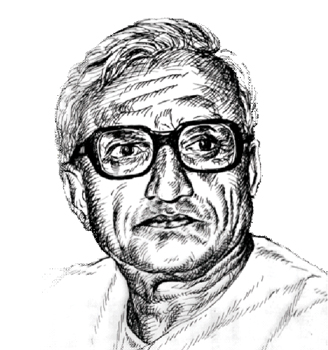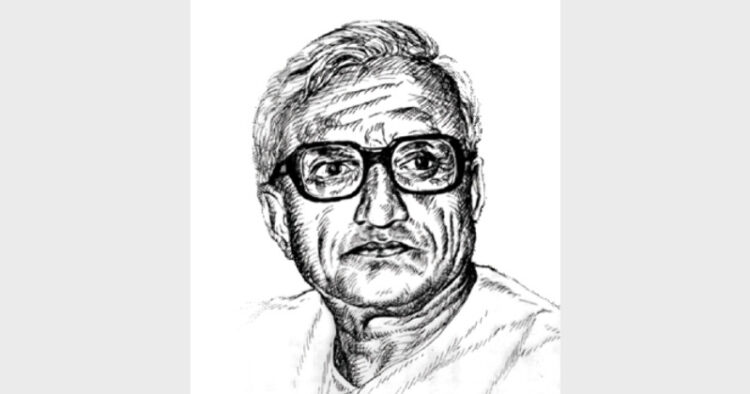
Shri Dattopant Thengadi was a visionary who wrote extensively on various economic aspects. He explained his thoughts in the light of the Sanatan Dharma and holistic thought perspective. He stressed on conceiving our own model of development in the light of our culture, past traditions, present requirements and aspirations for the future. This four-series article (beginning from the issue February 9, 2020) endeavours to acquaint the readers with the thoughts of Thengadiji on Western thinking and the Hindu concept of progress and development as a tribute to this great organiser-thinker on his birth centenary. This is the third part of the series
Ravindra Mahajan
Technology plays a pivotal role in the process of development. It develops constantly in all fields all over the world. There is no need to redevelop it. We should assimilate knowledge of all people. Thengadiji pleaded for a balanced approach towards technology. He wrote: “It is necessary to conduct research in modern as well as traditional, indigenous technology with a view to:
- Evolving a National Technological Policy to determine what portions of Western technology are to be adopted, what others to be adapted, what others to be rejected, and the areas in which evolution of (new) Bharatiya technology is imperative.
- Scrutinising the traditional technology to ascertain what portions of it are adaptable to modern conditions.
- Developing our own indigenous technology in consonance with our socio-cultural pattern taking the precaution that it should lead to decentralisation of the process of production; exploring the possibilities of converting home, instead of a factory, as a production unit with the help of power.
- Introducing for the benefit of our village artisans and craftsmen, appropriate modification in the traditional techniques of production, without enhancing the risk of (a) increase in unemployment, (b) wastage of available managerial and technical skills, and (c) complete recapitalisation (partial recapitalisation is understandable) of their existing means of production.”
He also stressed the following points:
- Foreign govts and companies should not have monopoly powers regarding technology resulting exploitation of Bharatiya entrepreneurs and consumers.
- Proper Control or ban on techniques that are harmful to the environment.
- Appointment of Technological Ombudsman on the national level.
Agriculture
- Agriculture should be given prominence in the economy.
- Concessions given to the industrial sector should also be suitably extended to the agriculture sector.
- Grants should be given directly to farmers rather than to manufacturers and suppliers of inputs like seeds, fertilizers, etc.
- A five-year plan should be devoted to agriculture itself. This should be utilised to prioritise issues pertaining to agriculture such as investments in agriculture, irrigation, agri-inputs, remunerative prices for agricultural goods, proper development and regulation of agricultural markets, developing technology and making it available through effective extension network, creating enough storage system of warehouses and cold storages, all-round development of farmers involved directly in farming and generally safeguarding their interests and other factors of management. This should be accompanied by making proper policies, necessary changes in the law, increasing direct budget expenditure on agriculture, giving importance to rural economies and above all cultivating a right mindset to give prominence to agriculture.
- While fixing the price of farm products based on expenditure, labour of the owner farmer and his family should be included in the expenses as manager and direct labourer.
- There should be a balance between the price of farm products and the cost of manufactured products in the industry (terms of trade).
- Thengadiji was founder of Kisan Sangh and laid down that it should work for the progress of the entire village as one family.
Industry
Thengadiji was in favour of the industrialisation of the country but he was insistent that instead of blindly following the West, industrialisation should be carried out as per the needs of the country and in our own way. Some of the important points put forward by him are:
- The BMS motto ‘Industrialise the Nation, Nationalise the Labour, Labourise the Industry’ brings out the elements of industrial policy.
- Maximum decentralisation of the large and medium industry in household units making a home, the centre of production.
- Use of appropriate technology and ensuring environment protection.
- Ownership of industry should be decided on practical considerations.
- He demanded integrated economic policy including production policy, income policy, price policy and wages policy in October 1968.
- Observing the maladministration of banking sector that provides the capital to industries, he suggested establishing Autonomous Financial Corporation way back in April 1971. Banks Board Bureau, an autonomous organisation has now been established in February 2016 to improve the management of govt.-owned banks.
Labour Policy
The success of Bharatiya Mazdoor Sangh itself demonstrates that a nationalist labour movement without foreign ideology can flourish in India.
Dattopantji proclaimed some basic ideological points in the very inaugural meeting of Bharatiya Mazdoor Sangh on July 23, 1955.
- The interests of the country come first, and then the interests of industry and labour in that order.
- BMS will be a non-political labour organisation, an organisation of workers, for workers and by workers that will be far away from party politics.
- It will be based on the Bharatiya economic thought and culture.
- Structure of society that is free from exploitation and abuse and based on justice and harmony.
- Honest work for the upliftment of Dalits, oppressed, neglected and downtrodden persons in society.
While talking on labour policy and advising workers he did not limit his thinking about issues directly concerning workers alone but contemplated on the economic life of the entire country and total national life. Some examples:
- ‘Industrialise the nation, Nationalise the labour, Labourise the industry’ these slogans by BMS gave an apt answer to the slogan ‘Nationalisation of all industries’ by Communists. BMS’ idea of ‘Labourisation’ of Industries promoted an idea where workers would collectively own and manage industrial units.
- BMS’ slogan ‘We will work in the interest of the country and take a full wage for the work done’ was an answer to the slogan by Communists “whatever may be the difficulties, our demands must be fulfilled”.
- Instead of ‘capital-oriented economic structure’ Thengadiji demanded ‘labour-oriented economic structure’ to eradicate poverty and unemployment. This expression brings out major aspects of BMS goals.
- Efficiency and productivity are important but it is essential to take measures to retain employment.
- Considering labour as capital and with a proper valuation of work of workers, workers should be given a share in profit, participation in management & ownership.
- The nation should have right over the surplus value created in the production process. The owner and workers should not grab it exclusively for themselves.
(The writer is former national co-convener of Swadeshi Jagaran Manch. Translated from original Marathi by Sharmila Bhagwat)













Comments